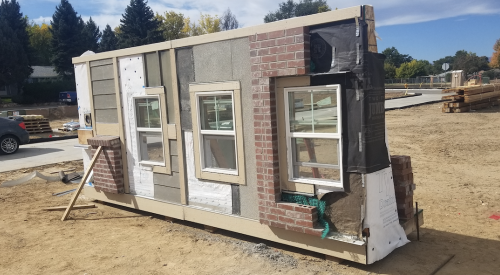In the old days, when building plans fit on two sheets of 18 by 24 paper, the industry built homes on a handshake between builder and trade. Needless to say, the industry has changed. Modern homes are complex systems that comprise dozens of subsystems.
Handshakes aren't enough anymore; today, builders need a contract from each trade partner outlining terms and conditions of work. In addition to the contract, builders need each trade to sign a scope of work describing what they'll accomplish.
But how specific should scopes of work be? Most would probably conclude that the scopes typically used in production home building aren't detailed enough to hold trades accountable for quality when it matters. Scopes tend to be vague; they usually contain a lot of legalese and relatively little information about the work to be completed, and they leave construction details up to each market, division and trade group. A scope of work usually reads more like a general contract than an agreement about the work a trade partner will perform.
"There's often a discrepancy between what builders expect from trades and what trades actually provide," says Dean Potter, vice president of quality assurance processes for K. Hovnanian Homes and former director of quality programs for the NAHB Research Center. "The more general scopes are, the more wiggle room exists for quality to vary."
The Role of Scopes of Work in the Home Building Process
Should the primary role of scopes be to convey legal information or to clearly communicate a builder's expectations? Dean Potter explains what he believes a scope should do for the national production builder. "A scope of work should be a tool that the construction manager and trade supervisor can use to manage construction quality. A scope shouldn't end up sitting in a file drawer, never to be used." Because builders can't be experts in all of the many systems that comprise today's homes — drainage planes, air barriers, waterproofing systems and so on — they rely on their trade partners to install these systems using industry standard products and installation practices. But due to the ever increasing amount of turnover in the trade base and the need for liability coverage that encompasses all trades, you can't rely on ambiguous documentation. Today, clearly written expectations are essential to establishing effective trade partnerships.
A construction project's scope of work provides work details and expectations: what is the work to be done on a project, how the workers should complete the job, and who is responsible for completing the different tasks.
Detailed scopes of work allow production builders to hold trades accountable for the systems they construct and install. Scopes clarify the role of each trade, establish performance standards and help a builder deliver a product of consistent quality. Scopes also help ensure that the impression customers receive about the level of care and quality invested in their homes is improved, not damaged, when they visit construction sites.
Why Scopes of Work Are Often Vague
Builders may be reluctant to provide detailed scopes, believing that they could increase liability. The home building industry encompasses many standards from code councils, industry groups, manufacturers and professional organizations, some of which directly conflict with one another. These standards don't have authority over a builder but they can wield significant leverage; if you follow one standard, you could be called to account for violating a competing standard.
In an attempt to ensure legal protection, a builder might include several applicable standards in a scope and hold a trade legally responsible for following all of them, even if they conflict. "I've seen scopes that say 'follow the manufacturer's instructions' and then proceed to give instructions that conflict with them," says Potter. "Trades will sign scopes with conflicting standards, because they want the work. But scopes with conflicting information create an environment where no one takes them seriously."
How to Develop Detailed Scopes of Work for Construction
Builders want to protect themselves from a legal standpoint, but they can't assure quality without being specific about their standards. So how can a builder provide detailed scopes of work and still protect itself from liability issues? It comes down to viewing the scope as a quality assurance tool rather than an extension of the trade contract. "The contract exists to protect the builder from liability, so make sure it provides sufficient legal protection. The scope plays a different role, so don't be afraid to provide specifics on quality in a scope," says Potter.
What if the builder finds out that a standard in its scopes isn't working? "Update the scope to improve the standard. A builder should take the leadership role in quality assurance, choosing standards based on experience and holding trades to those standards. Follow the quality assurance cycle — craft the scope to assure quality, implement it, evaluate it to see how well it's working and improve it. Repeat."
How Home Builders Can Implement Detailed Scopes of Work
Given the vast number of challenges the industry faces, Giants may find that implementing a program of detailed scopes with internal resources alone isn't cost-effective. Responding to the need for more detailed scopes, industry research groups have created template scopes designed to meet the needs of national production builders. One example is a set of scopes created by IBACOS (Integrated Building and Construction Solutions), a construction research and consulting firm. The template scopes, which are available free of charge to the industry at www.ibacos.com, were created in cooperation with the U.S. Department of Energy's Building America program.
Following Through on Scopes of Work in the Field
As with any construction document, detailed scopes have to be enforced on the job site to be effective. During construction, scopes shouldn't sit in a file drawer; they should be in the hands of construction managers and trade partners, guiding them through each installation. The construction department shouldn't have to call a trade partner after closing and ask why an installation wasn't performed according to the scope. "Don't assume a trade partner understands a scope just because he signed it," warns Potter. "Construction managers have to be thoroughly familiar with the content of their scopes and train the trades to follow them in detail."
How Detailed Scopes of Work and a Thorough Process Pay Off for Home Builders
Detailed scopes of work can make the home building process more effective in any division. The purchasing department can use detailed scopes to provide higher-quality materials and more cost-effective solutions. The construction department can use them to assure more consistent quality and performance throughout a project. The customer service department can use them to evaluate customer callbacks and improve the scopes of work used in future projects, helping to reduce or eliminate defects.
If scopes of work are crafted correctly at the corporate level, they can hold trades working in multiple markets to a uniform standard of performance, so that regardless of local codes, market constraints and trade groups, you can rest assured that your customers are buying a high-quality product. Individual markets will need customized scopes, but many details will be the same in all divisions.
It requires a commitment at the corporate and divisional level to implement detailed scopes of work throughout a national home-building company, but the effort can pay off in more consistent quality and performance across multiple divisions. Implementing a program of detailed scopes can help a builder spend less time resolving construction issues and more time moving forward to achieve goals for reputation, customer service and profitability.
Michael Dickens is the CEO of BuildIQ, which provides online training in best practices in home building.













